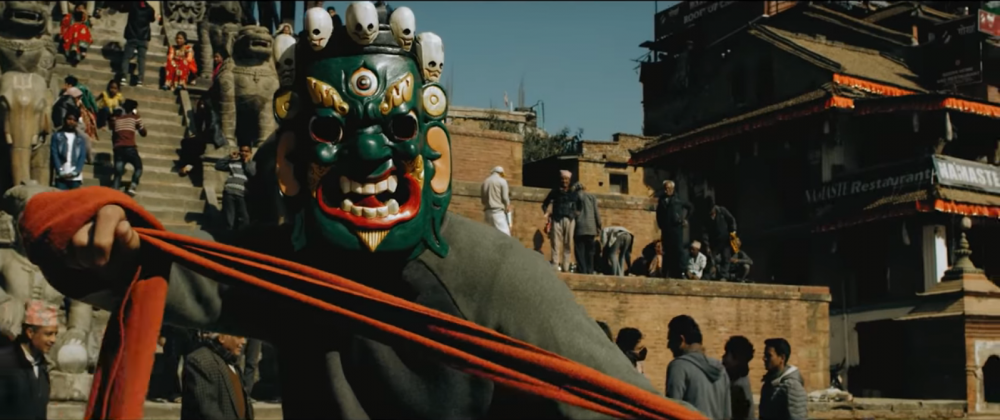
Disaffection by one’s current societal millieu stands as one in a myriad of reasons amid studies about why some people, including those of Islamic faith, would begin thinking the grass is greener with a terrorist organization. In pondering director Pema Dhondup Gakyil’s sophomore feature, The Man From Kathmandu, it needs reiterating that this is not a mere justification, but an important and worthy observation in engaging Gakyil’s independently-produced, slightly more escapist feat that orchestrates a much more poignant tale of redemption and love in its delivery.
Actor and rising action star Jose Manuel rises to the occasion in the years since putting his native Puerto Rico on the map with debut martial arts thriller, El Testigo (2011). Beating out one of several casting choices in following the film’s extensive development, Manuel stars front and center for his second lead role in The Man From Kathmandu as Faizal, a non-residential half-Hindu/Muslim Nepali living in Los Angeles. Manuel’s Faizal narrates for the viewer as we witness the inciting incident that highlights his animus toward America’s cultural melting pot which, as a Sharia loyalist, he views as a stain on all existence.
His mother is pained by his anguish and even moreso by the fact that, as it turns out, he’s been viewing certain “videos” incognito. Partly fueled by a need to reconnect with his father who at one point was fighting in Syria and whose well being remains a mystery, he leaves the country and lands in detouring Kathmandu where he then convenes with his grandparents and other extended family. In turn, he also stumbles into a turf war when he spots, Namrata (Anna Sharma), once his childhood sweetheart, seemingly being harrassed by thugs.
Unbeknownst to Faizal, they happen to do dirty work for Abu (Gulshan Grover), a local don and wanna-be politician vying for the property that houses tenants at the refugee and rehabilitation camp run by his grandfather, Suresh (Neer Bikram Shah), where Namrata also works. Incidentally, Faizal’s arrival also reopens old wounds with his grandfather who he blames for the dividing family rift and incurred seperation between him and his father who he sees, for all intents and purposes, as an avowed holy warrior he aspires to live up to.
To make matters worse, standing up for Namrata against Abu’s lacky, Sher Thapa (Karma) makes Faizal a moving target. Still par for the course for his potential ISIS cohorts in Syria, at one point he dons a wooden dragon mask to maintain his essential anonymity while fending off Abu’s goons as onlookers record the incident on their phones. The skirmish doesn’t fend off the looming threat of violence between Abu and his political opponent, Pundit Harshvardham (Hameed Sheikh), a religious zealot looking to take down Abu through his own corrupt ends.
As for Faizal, ideological clashes with some members of his family, coupled with his unrequited feelings for Namrata, add to the internal conflict he’s forced to mitigate with. A moment of truth ensues following another violent clash with Abu’s men at a local nightclub, adding to his reawakening and self-awareness about what’s at stake with both politically maligned gangsters escalating the violence; When tragedy strikes and the police provenly can’t be trusted, for Faizal, the pendulum between right and wrong swings ever more clearer.
That air of Faizal’s self-reflection is a constant for most of the film. It may very well be the most important factor in discerning what Gakyil offers up for The Man From Kathmandu, showcasing Manuel’s adaptability to such a hybridized and controversial character. It’s an unmistakable challenge to the average viewer to weigh the acceptance of what elucidates a cinematic action hero character like Faizal who, for what it’s worth, is a young, incorrigible man whose story is inspired by any number of the inherent tens of thousands of people recorded in data and analysis as promising ISIS recruits.
Much to Gakyil’s benefit, it’s a challenge that goes unfettered for anyone willing to suspend disbelief, especially in a world that has become increasingly aware and unforgiving to terrorism in any form. To that affect, and again, the film is in no way a defense or praise in anyway shape or form of any individual, much less Faizal, who betrays mankind and human decency for the sake of a twisted ideology that feeds into murderous and destructive behavior.
It’s as profound a moment as in several others that occur thereafter, including when an irritated Faizal’s voice narration is interrupted by a random passerby handing him back a piece of paper he chucks onto the pavement seconds earlier. Even darker gestures in his mannerism are exhibited in the first ten minutes, which is all you need to know about the psychological precipice Faizal stands before throughout the film. Beating up a racist in itself is one half of his ensnared psyche whilst exhibiting the other, more complex and chilling half that wishes him back in the arms of his father, thus encompassing the identity crisis and general diaspora that encumbers him.
The lovely Anna Sharma glows on screen as Namrata, Faizal’s childhood sweetheart now sharing tenure at the rehabilitation facility for refugees. Manuel’s cinematic pairing with Sharma isn’t a force-fed distraction from the story as much as it is a carefully conducted character arc that keeps it’s tangibility to the overall story next to other arcs throughout the film. To that end, it’s worth pointing out and complimenting that despite not being a fighting character, Namrata is less so a damsel in distress than in some films where female roles are flimsily treated.
Grover, a well-known Bollywood industry talent, lends a consumate villainous portrayal of Abu who is as saidistic as you would expect at first glance. Joining him on the antagonist end of things is local actor, Karma, who terrorizes in the role of Sher Thapa along with actor Amir Gautam who plays Abu’s towering enforced and hitman, Ismail. Adding to the nefarious fervor is Sheik in the role of Harshvardham, who assuredly leaves a memorably evil mark on film going forward. Shishir Bangdel is a slightly harder nut to crack in the role of Praveen, a detective with a dark side while earnestly aware of the “work to be done” in ridding his town of crime and courruption.
The Man From Kathmandu takes a staunch look into the soul of an individual rather than telling the typical, straightforward hero story that we’ve seen before. Invariably, what we get is different kind of action film that rewardingly laces itself together with the kind of smartly-crafted Hong Kong-style martial arts action Manuel has earned his notoriety for while doing shortfilms in Puerto Rico. Assembling a small team of stunt cohorts from Puerto Rico, Spain and local Nepali talent, Manuel and co-coordinator Dani Medina showcase their ingenuity as a functioning unit from storyboarding to choreography and cinematography, and all done in a back-to-back period of just eighteen days. Even fellow burgeoning actor Angel Vasquez impressively gets in on the fight action co-starring one of Abu’s underlings for a key tete-a-tete with Manuel at the nightclub.
Select points of criticism manily lie with certain areas of the story that prove a bit difficult to iron out between a few of the character arcs. At least one caucasian character appears near within the third act and while it serves as a possible key plot point – similar to a few other preceding areas of the film, not much is explained thoroughly. Some bits are more self-explanatory than those few others which do tend to suffer from lack of cohesion. Thankfully, this doesn’t take away from the broader transcendence of the story and its aim, which is where the writing strongly benefits as do the performances.
There’s a not-so-old adage here I’m reminded of when considering Faizal’s plight in life. It stems from Aaron Eckhart’s portrayal as Harvey Dent, bookended by Christian Bale’s exiting scene in the title role of Christopher Nolan’s The Dark Knight (2008), and I brought it up with Manuel in a recent video chat which suprised him delightfully. I won’t add the quote here so as to go off on a verbose comic book movie tangent – really, I just found it fascinating that I was able to derive as much from the narrative in this film. Plus, The Man From Kathmandu is not that kind of film, and so I digress.
In a world rife with millions of problems faced by billions of people, the subject of terorrism will always be fair game for cinema. What matters is how an artist conducts his/her visionary means and purpose through such subject matter, and for this, Gakyil invokes a well-thought, considerate agile, often compelling action drama that defies filmic norms with the best of intentions. Moreover, it helps greatly that he’s done so here with the likes of Jose Manuel, someone who has come a long way from his shortfilm roots in Vega Baja to now being recognized, concordantly and without refutation, as a versatile, world-class talent.

